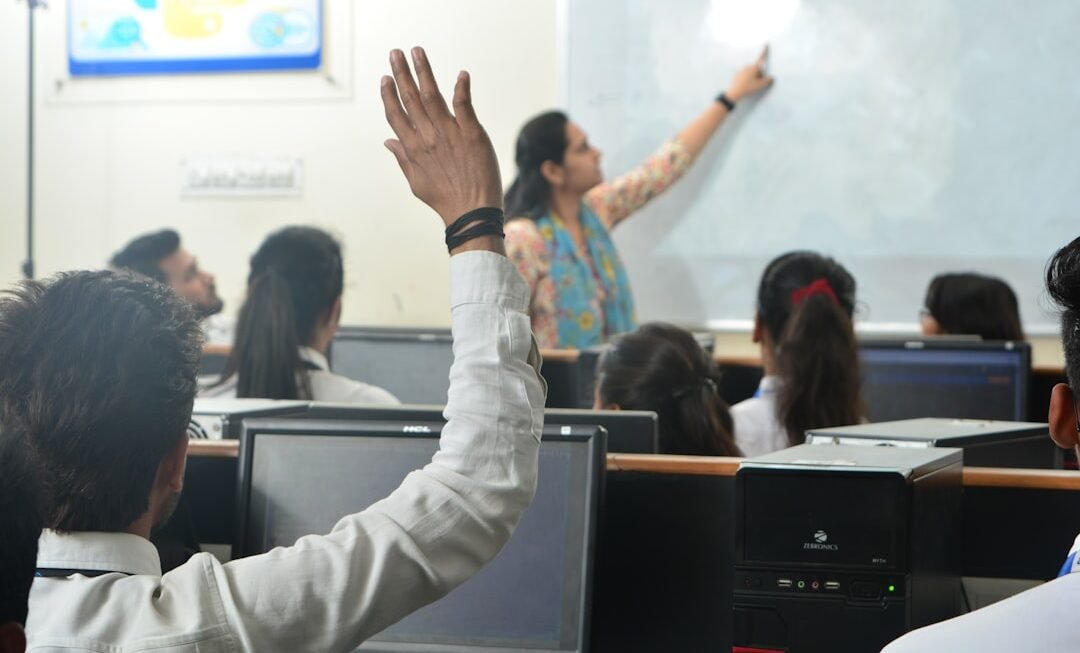The advent of the internet has revolutionized the landscape of education, giving rise to online teaching as a prominent mode of learning. This transformation has not only democratized access to knowledge but has also fostered a culture of lifelong learning. Lifelong learning refers to the continuous, self-motivated pursuit of knowledge for personal or professional development.
In this context, online teaching serves as a vital conduit, enabling individuals to engage with educational content at their own pace and convenience. The flexibility inherent in online learning allows learners to tailor their educational journeys according to their unique needs and circumstances. As society evolves, the importance of lifelong learning becomes increasingly evident.
Rapid technological advancements and shifting job markets necessitate that individuals remain adaptable and informed.
The integration of technology into education not only enhances accessibility but also encourages a culture where learning is viewed as an ongoing process rather than a finite phase confined to traditional schooling years.
Key Takeaways
- Online teaching provides flexibility and accessibility for lifelong learners to continue their education.
- Diverse learning opportunities are available online, catering to various interests and learning styles.
- Personalized learning experiences can be achieved through online teaching, allowing for individualized instruction and support.
- Online education helps build a global learning community, connecting learners from around the world.
- Online courses offer professional development and skill enhancement opportunities for career advancement and growth.
Accessibility and Flexibility of Online Learning
One of the most significant advantages of online learning is its unparalleled accessibility. Individuals from various backgrounds, regardless of geographical location or socioeconomic status, can access high-quality educational resources with just a few clicks. This democratization of education is particularly beneficial for those who may face barriers in traditional learning environments, such as individuals with disabilities, working professionals, or those living in remote areas.
Online platforms often provide materials in multiple formats—videos, articles, interactive quizzes—ensuring that learners can engage with content in ways that suit their preferences and learning styles. Flexibility is another hallmark of online education. Unlike conventional classroom settings that adhere to rigid schedules, online courses allow learners to study at their own pace.
This adaptability is crucial for individuals balancing work, family commitments, or other responsibilities. For instance, a working parent can choose to engage with course materials during their child’s nap time or after hours, making it feasible to pursue educational goals without sacrificing personal obligations. This flexibility not only enhances the learning experience but also empowers individuals to take charge of their educational journeys.
Diverse Learning Opportunities Available Online
The breadth of learning opportunities available through online platforms is staggering. From academic subjects like mathematics and science to creative pursuits such as photography and writing, the range of courses is vast and varied. Institutions and organizations worldwide have recognized the potential of online education and have developed programs that cater to different interests and skill levels.
For example, platforms like Coursera and edX offer courses from prestigious universities, allowing learners to study subjects ranging from artificial intelligence to philosophy. Moreover, online learning is not limited to formal education; it encompasses a wide array of informal learning opportunities as well. Webinars, workshops, and MOOCs (Massive Open Online Courses) provide learners with access to expert knowledge and insights on specific topics.
This diversity enables individuals to explore new fields or deepen their understanding of existing ones without the constraints typically associated with traditional education systems. As a result, learners can cultivate a well-rounded skill set that aligns with their personal interests and professional aspirations.
Personalized Learning Experiences through Online Teaching
Personalization is a key feature of online teaching that sets it apart from traditional educational models. Many online platforms utilize adaptive learning technologies that assess individual learners’ strengths and weaknesses, tailoring content accordingly. This approach allows students to progress at their own pace, ensuring they fully grasp concepts before moving on to more advanced material.
For instance, platforms like Khan Academy employ algorithms that adjust the difficulty of exercises based on a learner’s performance, providing a customized experience that fosters deeper understanding. Additionally, online education often allows for greater interaction between instructors and students through discussion forums, live Q&A sessions, and one-on-one mentoring opportunities. This level of engagement can lead to more meaningful learning experiences as students receive immediate feedback and support tailored to their specific needs.
The ability to connect with educators from around the globe further enriches the learning process, exposing students to diverse perspectives and teaching styles that enhance their understanding of the subject matter.
Building a Global Learning Community through Online Education
Online education transcends geographical boundaries, fostering a global learning community that connects individuals from diverse cultures and backgrounds. This interconnectedness enriches the educational experience by facilitating cross-cultural exchanges and collaborative projects. For example, students enrolled in an international business course may work together on case studies with peers from different countries, gaining insights into various market dynamics and cultural considerations.
Moreover, online platforms often incorporate social learning elements that encourage interaction among learners. Discussion boards, group projects, and peer reviews create opportunities for students to share ideas, challenge each other’s thinking, and build relationships that extend beyond the virtual classroom. This sense of community not only enhances motivation but also cultivates a supportive environment where learners can thrive together.
As individuals engage with peers from around the world, they develop a broader worldview that prepares them for success in an increasingly interconnected global economy.
Professional Development and Skill Enhancement through Online Courses
In today’s fast-paced job market, continuous professional development is essential for career advancement. Online courses provide an accessible means for individuals to acquire new skills or enhance existing ones without the need for extensive time commitments or financial investments associated with traditional education. Many professionals turn to platforms like LinkedIn Learning or Udemy to gain expertise in specific areas such as digital marketing, project management, or data analysis.
These courses often feature industry-relevant content delivered by experienced practitioners who understand the current demands of the workforce. By engaging with practical case studies and real-world applications, learners can immediately apply their newfound knowledge in their professional roles. Furthermore, many online courses offer certifications upon completion, which can bolster resumes and demonstrate a commitment to ongoing professional development—a crucial factor in standing out in competitive job markets.
Online Teaching as a Tool for Continuing Education
Continuing education is vital for professionals seeking to stay relevant in their fields or transition into new careers. Online teaching has emerged as a powerful tool for facilitating this process by providing accessible pathways for skill acquisition and knowledge enhancement. Many industries require ongoing training to keep pace with technological advancements or regulatory changes; online courses can help professionals meet these requirements efficiently.
For instance, healthcare professionals often need to complete continuing education units (CEUs) to maintain licensure. Online platforms offer specialized courses that cover the latest medical practices or innovations in patient care, allowing practitioners to fulfill their educational requirements conveniently. Similarly, educators can engage in professional development through online workshops focused on new teaching methodologies or curriculum design, ensuring they remain effective in their roles.
Overcoming Barriers to Lifelong Learning with Online Education
Despite the numerous advantages of online education, barriers still exist that can hinder individuals from fully engaging in lifelong learning. Factors such as lack of motivation, time constraints, or financial limitations can pose significant challenges. However, online education offers solutions that can help mitigate these obstacles.
For instance, many platforms provide free or low-cost courses that make learning accessible regardless of financial circumstances. Additionally, the self-paced nature of online courses allows learners to fit education into their busy lives without overwhelming themselves. By breaking down content into manageable modules or lessons, individuals can progress at a speed that suits their schedules.
Furthermore, many online platforms incorporate gamification elements—such as badges or leaderboards—that can enhance motivation by providing tangible rewards for completing tasks or achieving milestones.
Online Teaching for Career Advancement and Growth
The role of online teaching in career advancement cannot be overstated. As industries evolve and new technologies emerge, professionals must adapt by acquiring new skills and knowledge relevant to their fields. Online courses provide an efficient means for individuals to upskill or reskill without disrupting their current employment.
For example, someone working in marketing may choose to take an online course in data analytics to better understand consumer behavior and improve campaign effectiveness. Moreover, many employers recognize the value of continuous learning and actively encourage employees to pursue online education as part of their professional development plans. Companies may even offer financial support for employees seeking certifications or advanced training through accredited online programs.
This investment not only benefits individual employees but also enhances organizational performance by fostering a culture of innovation and adaptability.
Integrating Online Learning into Everyday Life
Integrating online learning into daily routines can significantly enhance personal growth and development. With the flexibility offered by online courses, individuals can seamlessly incorporate educational activities into their lives without feeling overwhelmed. For instance, someone might dedicate a portion of their lunch break to watching instructional videos or set aside time during weekends for more intensive study sessions.
Additionally, many online platforms offer mobile applications that allow learners to access course materials on-the-go. This convenience means that individuals can engage with educational content while commuting or during downtime throughout their day. By making learning a regular part of everyday life—whether through podcasts during workouts or short lessons during breaks—individuals can cultivate a habit of continuous improvement that enriches both personal and professional aspects of their lives.
The Future of Lifelong Learning with Online Teaching
The future of lifelong learning is undoubtedly intertwined with the evolution of online teaching methodologies and technologies. As educational institutions continue to innovate and adapt to changing societal needs, we can expect even greater advancements in how knowledge is delivered and consumed. The ongoing integration of artificial intelligence and machine learning into educational platforms promises personalized experiences that cater specifically to individual learners’ needs.
Furthermore, as global connectivity increases and more people gain access to the internet, the potential for collaborative learning across borders will expand exponentially. This interconnectedness will not only enhance individual educational experiences but also contribute to a more informed global citizenry capable of addressing complex challenges facing society today. In this dynamic landscape, online teaching will remain a cornerstone of lifelong learning—empowering individuals to pursue knowledge relentlessly throughout their lives.












